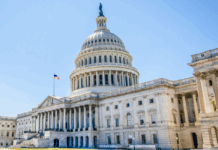
With the passage into law of Consolidated Appropriations Act of 2018, Congress completed work on the $1.3 trillion omnibus spending bill that funds the federal government through Sept. 30.
Based on the new budget caps enacted in February in the Bipartisan Budget Act of 2018, the bill substantially boosts funding for a number of priority health care programs. Overall, it includes $88.1 billion for the Department of Health & Human Services, a $10.1 billion increase from FY 2017. Among other provisions, it appropriates $290.8 million for rural health programs, a $135 million increase over FY 2017 levels. It also raises funding for a variety of workforce development programs including $3.6 billion to fight opioid abuse and includes provisions to improve the nation’s broadband infrastructure, including $600 million for a Department of Agriculture pilot program to expand broadband access in rural areas.
In addition to passing the spending bill, Congress held hearings on health care related issues action last week including:
- The House Energy and Commerce Committee held a two-day hearing on a variety of bills focused on addressing the opioid crisis. Lawmakers hope to have bipartisan legislation ready for consideration by Memorial Day.
- The House Ways and Means Committee held a lengthy hearing on implementation of MACRA, the new physician reimbursement model that replaced the sustainable growth rate formula. The Bipartisan Budget Act of 2018 included several changes to promote flexibility in the new system.
- The Senate Indian Affairs Committee held an oversight hearing on opioids with a focus on ensuring that relevant patient data is collected through the Prescription Drug Monitoring Program (PDMP). Michael Toedt, Indian Health Service (IHS) Chief Medical Officer, testified that the agency has partnered with 17 of 18 states with federal IHS pharmacies to connect their PDMPs to electronic health records. They are also encouraging tribes to connect their databases. In addition, they are planning to partner with tribes to gather more data on how telemedicine is used for behavioral health.
In other news, Seema Verma, Administrator, Centers for Medicare & Medicaid Services (CMS), previewed an overview of the administration’s Medicare and Medicaid agenda going forward. According to a news report in Politico, she declared that CMS will “double down” on price transparency, with a desire to help enrollees understand their costs. She also said the agency wants to reduce the burden on providers, partly by shrinking their reporting measures and changing the conditions of participation. She noted the agency is pursuing changes in the Stark law to ease barriers for providers who enter into value-based payment arrangements. She noted that the agency will use the annual payment rules as the vehicle for proposing these changes.
Congress is on a two-week recess and will return to Washington, D.C. the week of April 9.






